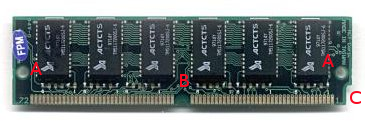Difference between revisions of "All about memory"
Jump to navigation
Jump to search
| Line 4: | Line 4: | ||
: SIMM (Single In-Line Memory Module) | : SIMM (Single In-Line Memory Module) | ||
| − | Image:72-pin-simm.png | + | [[Image:72-pin-simm.png]] |
72 pin SIMMS are 4.25 inches long. This is about the same length as a cache module, but the holes and notches to install them are different, see points A (side holes), B (center notch) and C (side notch) in the picture. | 72 pin SIMMS are 4.25 inches long. This is about the same length as a cache module, but the holes and notches to install them are different, see points A (side holes), B (center notch) and C (side notch) in the picture. | ||
Revision as of 11:52, 21 March 2009
RAM (or Random Access Memory) is an important part of the computer system which is used by actively running programs to perform necessary tasks while the computer is on. It is composed of integrated circuit memory chips that allow information to be stored or accessed in any order and all storage locations are equally accessible. The information on RAM can be tossed out to make more space, as opposed to the Hard Disk Drive where the computer stores information for the long haul.
- Memory sticks, or RAM, come in 2 types
- SIMM (Single In-Line Memory Module)
72 pin SIMMS are 4.25 inches long. This is about the same length as a cache module, but the holes and notches to install them are different, see points A (side holes), B (center notch) and C (side notch) in the picture.
- SIMM is the oldest form of memory and is shorter than the currently-used types - generally 4.25" long or 3" long. Its slots on the motherboard have metal clamps at the end to hold the stick in place.
- DIMM (Dual In-Line Memory Module)
- DIMMs are usually 5.25" long and plug into slots that have plastics clips at the end that open and close to hold them in. There is also a type of DDR that is only 2.5-2.75" long known as SODimm that is used in laptops and small computer systems
